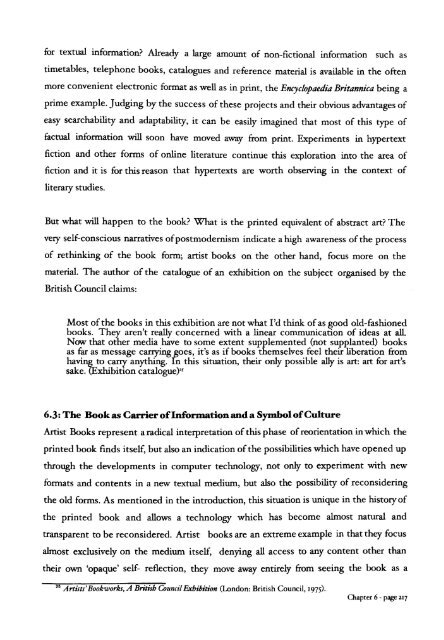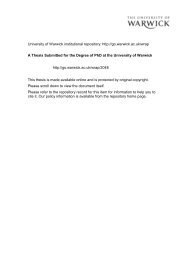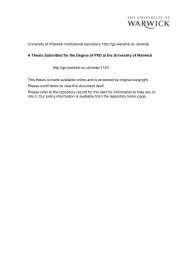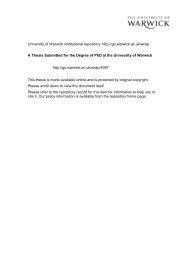From Page to Screen - WRAP: Warwick Research Archive Portal ...
From Page to Screen - WRAP: Warwick Research Archive Portal ...
From Page to Screen - WRAP: Warwick Research Archive Portal ...
You also want an ePaper? Increase the reach of your titles
YUMPU automatically turns print PDFs into web optimized ePapers that Google loves.
for textual information? Already a large amount of non-fictional information such as<br />
timetables, telephone books, catalogues and reference material is available in the often<br />
more convenient electronic format as well as in print, the Encyclopaedia Britannica being a<br />
prime example. Judging by the success of these projects and their obvious advantages of<br />
easy searchability and adaptability, it can be easily imagined that most of this type of<br />
factual information will soon have moved away from print. Experiments in hypertext<br />
fiction and other forms of online literature continue this exploration in<strong>to</strong> the area of<br />
fiction and it is for this reason that hypertexts are worth observing in the context of<br />
literary studies.<br />
But what will happen <strong>to</strong> the book? What is the printed equivalent of abstract art? The<br />
very self-conscious narratives ofpostmodemism indicate a high awareness ofthe process<br />
of rethinking of the book form; artist books on the other hand, focus more on the<br />
material. The author of the catalogue of an exhibition on the subject organised by the<br />
British Council claims:<br />
Most ofthe books in this exhibition are not what I'd think ofas good old-fashioned<br />
books. They aren't really concerned with a linear communication of ideas at all.<br />
Now that other media have <strong>to</strong> some extent supplemented (not supplanted) books<br />
as far as message carrying goes, it's as ifbooks themselves feel their liberation from<br />
having<strong>to</strong> carry anything. In this situation, their only possible ally is art: art for art's<br />
sake. (Exhibition catalogue)"<br />
6.3: The Bookas CarrierofInformationanda SymbolofCulture<br />
Artist Books represent a radical interpretation ofthis phase ofreorientation in which the<br />
printed book finds itself, but also an indication ofthe possibilities which have opened up<br />
through the developments in computer technology, not only <strong>to</strong> experiment with new<br />
formats and contents in a new textual medium, but also the possibility of reconsidering<br />
the old forms. As mentioned in the introduction, this situation is unique in the his<strong>to</strong>ryof<br />
the printed book and allows a technology which has become almost natural and<br />
transparent <strong>to</strong> be reconsidered. Artist books are an extreme example in that they focus<br />
almost exclusively on the medium itself, denying all access <strong>to</strong> any content other than<br />
their own 'opaque' self- reflection, they move away entirely from seeing the book as a<br />
25 Artists' Bookworks, A BritishCouncil Exhihition (London: British Council, 1975).<br />
Chapter 6 - page 217





